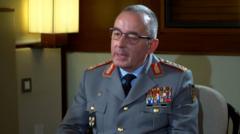**Amidst rising tensions, Germany’s defense chief warns NATO must bolster defenses against a looming Russian threat, citing military production rates and the vulnerability of Baltic states.**
**Germany Warns of Potential Russian Attack on NATO within Four Years**

**Germany Warns of Potential Russian Attack on NATO within Four Years**
**Concerns Over Russian Military Buildup Highlight Urgent Need for NATO Preparedness**
Despite recent differences among NATO members, German defense chief General Carsten Breuer has issued a stark warning about the increasing threat posed by Russia, suggesting that NATO should prepare for a possible attack within the next four years. Speaking at the Shangri-la Dialogue in Singapore, General Breuer highlighted that Russia's military production rates are alarmingly high, with around 1,500 main battle tanks being produced annually. This capability, he suggests, could be utilized in a future assault on NATO's Baltic members by 2029, or potentially sooner.
General Breuer emphasized that the NATO alliance remains united in the face of the ongoing war in Ukraine, despite differing views from nations like Hungary and Slovakia. He described the situation as a “very serious threat” that he has not encountered in his four-decade career, asserting that Russia is significantly ramping up military preparations.
He noted that not all military assets are being deployed to Ukraine; substantial stockpiles are being amassed for potential operations against NATO allies. Russian production extends beyond tanks to include vast amounts of artillery ammunition, further indicating a strategic buildup aimed at threatening the Western alliance.
Furthermore, General Breuer pointed out the vulnerabilities in the so-called “Suwalki Gap,” a crucial area bordering Lithuania, Poland, Russia, and Belarus, which would be particularly exposed in the event of a conflict. He drew parallels to the varying perceptions of risk between European nations, highlighting the sense of immediate danger felt by those in the Baltic states compared to nations further west.
The defense chief also discussed Russia's broader strategy, portraying the war in Ukraine as part of a larger continuum in its conflict with NATO, suggesting that Russia is actively testing NATO’s defensive capabilities. Incidents involving cyber attacks and surveillance over critical infrastructure in Germany served as recent reminders of this ongoing tension.
Amidst these threats, General Breuer urged NATO allies to bolster their military forces and indicated a clear need for increased defense spending. He reiterated the importance of NATO's cohesion, citing the swift integration of Finland and Sweden into the alliance post-Ukraine war as evidence of unity among member states.
His comments underscore a significant shift in Germany's defense posture, indicating a growing consensus on the necessity of reversing years of military underinvestment. However, the path toward bolstering European military capacity may be lengthy, with existing challenges in ramping up production to meet the urgent demands of defense against a resurgent Russia.
General Breuer emphasized that the NATO alliance remains united in the face of the ongoing war in Ukraine, despite differing views from nations like Hungary and Slovakia. He described the situation as a “very serious threat” that he has not encountered in his four-decade career, asserting that Russia is significantly ramping up military preparations.
He noted that not all military assets are being deployed to Ukraine; substantial stockpiles are being amassed for potential operations against NATO allies. Russian production extends beyond tanks to include vast amounts of artillery ammunition, further indicating a strategic buildup aimed at threatening the Western alliance.
Furthermore, General Breuer pointed out the vulnerabilities in the so-called “Suwalki Gap,” a crucial area bordering Lithuania, Poland, Russia, and Belarus, which would be particularly exposed in the event of a conflict. He drew parallels to the varying perceptions of risk between European nations, highlighting the sense of immediate danger felt by those in the Baltic states compared to nations further west.
The defense chief also discussed Russia's broader strategy, portraying the war in Ukraine as part of a larger continuum in its conflict with NATO, suggesting that Russia is actively testing NATO’s defensive capabilities. Incidents involving cyber attacks and surveillance over critical infrastructure in Germany served as recent reminders of this ongoing tension.
Amidst these threats, General Breuer urged NATO allies to bolster their military forces and indicated a clear need for increased defense spending. He reiterated the importance of NATO's cohesion, citing the swift integration of Finland and Sweden into the alliance post-Ukraine war as evidence of unity among member states.
His comments underscore a significant shift in Germany's defense posture, indicating a growing consensus on the necessity of reversing years of military underinvestment. However, the path toward bolstering European military capacity may be lengthy, with existing challenges in ramping up production to meet the urgent demands of defense against a resurgent Russia.






















